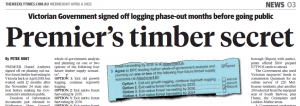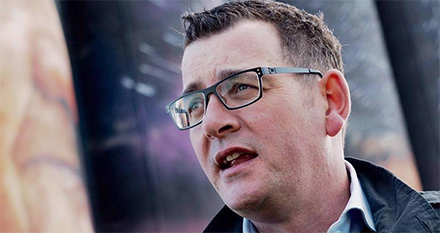Victoria’s Premier Dan Andrews has been accused of treating the forestry sector “like fools”. The comment by Timber Towns Victoria chair Karen Stephens follows a report in the Weekly Times that Mr Andrews signed off on phasing out native forest timber harvesting in Victoria in April 2018 but waited until 12 months after the November 24 State Election that year before making his government’s intentions public. Source: Timberbiz
Cr Stephens said confirmation that Mr Andrews went to the last election and did not disclose the state government’s intention to shut down the native timber sector was blatantly misleading.
She said evidence that the Premier had signed off on a timber phase out before going public had treated the forestry sector “like fools”.
Freedom of Information documents just released to Wellington Shire Council, after more than two years of requests and appeals, showed the Premier opted for the 2030 harvesting phase out in a two-page briefing paper he signed on April 9, 2018, titled Native Forestry industry Transition Approach.

From today’s Weekly Times.
The Weekly Times reports that the briefing paper asked Mr Andrews to sign off on his own Department of Premier and Cabinet “leading further whole-of-government analysis and planning on one or two options of the following four future timber supply scenarios”:
- OPTION 1: Exit old growth logging, continue regrowth logging
- OPTION 2: Exit native forest harvesting by 2035
- OPTION 3: Exit native forest harvesting by 2030
- OPTION 4: Exit native forest harvesting by 2024
The Weekly Times reports that the Premier ticked off on the 2030 option and no other, including a handwritten note that said: “Negotiations should be expedited – not delayed”.
The Premier then waited until 6 November 2019, to announce “all logging in native forests across the state (is) to stop by 2030”.
“The Victorian government knows the devasting flow-on impacts in small regional communities where there are limited alternative employment opportunities, low chance of re-skilling, and when 35% of log sawmilling are sole income earner for their household,” Cr Stephens said.
She said Victoria had the capacity to maintain a financially viable and sustainable native timber industry supporting thousands of workers, their families and businesses.
She said the State had 7.64 million hectares of native forest with 94% of the native forests unavailable for harvesting. Only 3,000 hectares are harvested each year – that equates to just 0.04% of 7,645,000 hectares = 4 trees in 10,000 with every tree harvested regrown by law.
All Victoria Old Growth Forest cannot be harvested for timber products and are protected by law.
“The native timber industry is critical in the fight against climate change with the Intergovernmental Panel on Climate Change Sixth Assessment Report stating that sustainable forest management can increase and maintain forest carbon sinks through harvest, transfer of carbon to wood products and their use to store carbon and substitute emissions-intensive construction material,” Cr Stephens said.
“The native timber industry thus provides a climate solution. The industry improves forest health by regenerating forest areas badly damaged or killed by high-intensity bushfires.
“So why would the current Victorian government be so intent on closing down this industry?”
One key industry source, with access to the inner workings of the Labor Party, told the Weekly Times the Andrews regime was fearful of an electoral backlash in the Morwell electorate, which it was trying to take from the former Nationals MP Russell North, who at the time held the seat on a margin of just 1.8 per cent.
At the time the Latrobe Valley was already suffering from the effects of the Hazelwood power station closure, with the 750 direct and 300 indirect job losses.
Nationals Leader Peter Walsh said “if they’d agreed to it (phase out), they should have taken it to the election and been honest on what they intended to do”.
According to the Weekly Times, other documents released under FoI to Wellington Shire showed that after the election the Government commissioned Quantum Market Research to gauge the views of 12 focus groups on native forest harvesting, across key battleground electorates – Melbourne, Narre Warren, Geelong, Shepparton, Dandenong Ranges and Maryborough (Ripon), with participants offered $100 prepaid EFTPOS cards to attend.
The Government also used Victorian taxpayers’ funds to commission Quantum for an online survey of 220 Melbourne residents, plus another 200 selected from the marginal seat of South Barwon, plus Hume, the Grampians and Loddon-Mallee areas.
“Offering $100 prepaid EFTPOS cards to attend forums to gauge the view of focus groups on native timber harvesting, specifically across the marginal seats is absolutely disgusting and shows this government for what it truly is,” Cr Stephens said.
Mr Walsh slammed what he described as Labor’s destructive campaign against hard-working Victorians in the native timber industry.
“The Premier knew Labor’s end goal but then spent 18 months gaslighting Victorian timber workers and contractors with lies that their future was secure,” Mr Walsh said.
“Daniel Andrews signed off on the industry’s closure in 2018, based on sham focus groups, social media analytics, and a radical green ideological agenda.
“This is further proof that Labor always abandons regional communities to pander to the Greens and their inner-city voters.”
As late as October 2019, then Agriculture Minister Jaclyn Symes was publicly claiming State Labor supported the “sustainable” timber industry.”
Timber workers and contractors were blindsided by Labor’s ban just a month later, with the Minister claiming “the native timber industry isn’t sustainable” and “we do not have enough native forest to meet demand”.
“These documents expose the truth that State Labor has been secretly waging war on Victorian jobs and livelihoods for years,” Mr Walsh said.
“Only a change in government in November will see the 2030 ban reversed to secure a future for Victorian jobs and the small communities in Gippsland and north-east Victoria that rely on the industry for survival.”
A Government spokesman told the Weekly Times “the Victorian Forestry Plan has always been about transitioning the native forest industry to a range of new opportunities by 2030, and setting up a strong plantation-based sector for decades to come” and the March 2018 brief did not recommend the adoption of a policy by the Victorian Government.”







